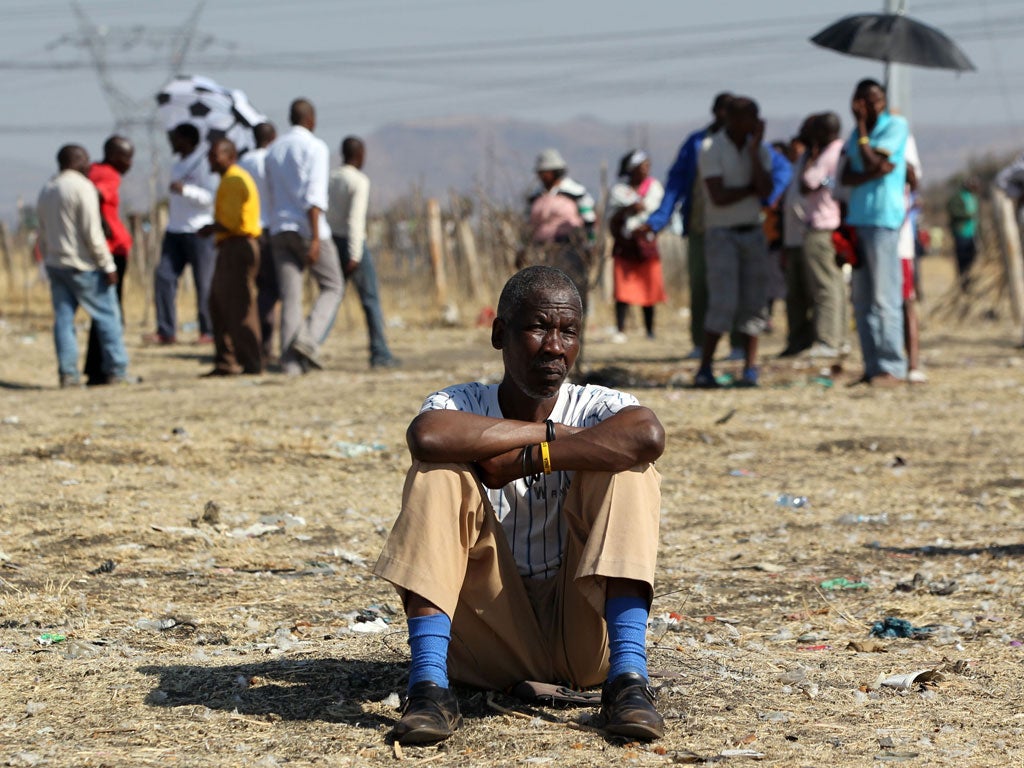South Africa's platinum wars
How a lump of white metal has led to a bloody labour dispute in South Africa – and the violence could yet spread...

A week after police shot dead 34 strikers outside Lonmin's Marikana platinum mine in South Africa in the bloodiest scenes since apartheid ended, mining company leaders are warning that the disruption could spread – first to other platinum sites, and then to the South Africa's other biggest mineral industries, with gold seen as the next most likely candidate, followed by coal.
South Africa is responsible for 80 per cent of the world's platinum production, and the price of the white metal, a key component for the auto industry, has already jumped more than 10 per cent in the past week.
"We can't be naive enough to think this problem won't expand to an industry-wide problem," said Nick Holland, chief executive of the world's fourth biggest gold producer, Gold Fields. Meanwhile Terence Goodlace, chief executive of Impala Platinum, the world's second biggest producer of the metal, warned that the platinum industry faced "significant risk".
The unrest began two weeks ago when 3,000 drill operators at Lonmin's Marikana mine, 60 miles north-west of Johannesburg in Rustenburg, went on what the company calls an illegal strike, demanding a tripling of their salaries.
The strikers belong to the fledgling Association of Mineworkers and Construction, set up to challenge the 30-year-old National Union of Mineworkers (NUM), which many regard as being too close to politicians and big business. Clashes between the rival unions, Lonmin's security staff and police have resulted in 44 deaths, although the violence has subsided in recent days.
Mr Goodlace at Impala Platinum (Implats) said: "The platinum industry is experiencing increased levels of industrial action, as witnessed at both Impala Rustenburg at the beginning of this year and more recently at Lonmin, with the associated tragic loss of life. These developments pose a significant risk to the industry."
Implats was itself forced to close its Rustenburg operations – the world's biggest platinum mine – for six weeks earlier this year when four people were killed in violent clashes between the two trade unions. The disruption saw its annual production cut by 21 per cent and cost the company £213m in revenues.
Production at Lonmin's operations at Marikana, also in Rustenberg, has now been suspended for 14 days, and the miner is forecast to lose production equivalent to about 7 per cent of last year's output.
Seemingly inspired by recent disputes, a group of workers at the Thembelani mine – owned by Anglo American's Amplats subsidiary, the world's biggest platinum producer – have given the company until today to comply with a list of demands.
Fears of disruption among the world's three biggest platinum producers has already been enough to push global platinum prices up 11 per cent in the past week, following a 25 per cent decline in the previous 12 months as the economic slump pushed down car sales. Platinum is primarily used in catalytic converters for cars and trucks.
By the admission of the industry titans themselves, platinum production is likely to be hit hard in the coming weeks in South Africa. Analysts expect continuing disruption to push prices up by around 5 to 10 per cent in the next few weeks.
The problems at Lonmin are clear – with no guarantee that production will recommence on Monday, the miner has issued a profits warning, admitted it is in danger of breaching its debt covenants and may have tap investors for more money with a rights issue that could be about $1bn. Its troubles were compounded last week when the chief executive, Ian Farmer, was diagnosed with a serious illness and rushed to hospital.
However, as South Africa held a day of nationwide memorials for Marikana yesterday, experts were hopeful that the disruption across the industry will be limited. "I can't see the disruptions going on for more than a few weeks," one industry analyst said. "Workers need to get paid because they need cash to feed their families and the miners need to resume operations."
Des Kilalea, an analyst at RBC Capital Markets, added: "There will be increased stoppages, but everyone will behave differently because of the human cost and the impact on government tax revenues. Besides, it will deter new investment in South Africa."
Implats' Mr Goodlace, although admitting that the situation is still "fairly volatile" , believes labour relations at his Rustenberg mine are now "relatively stable".
Meanwhile, about 1,000 workers at the Royal Bafokeng platinum mine who downed tools on Wednesday and blocked fellow miners from going to work returned to work yesterday after intervention by the NUM. "Workers thought, because other platinum mines in the north-west were striking, they also had the right to demand a salary increase. We explained to them that they can't ignore their initial agreement," Sydwell Dokolwana of the NUM said. .
Nor are any disruptions likely to lead to shortages of platinum, for now at least. The FTSE 250 miner Aquarius Platinum recently estimated that nearly half a million of the 6 million ounces of the metal produced globally each year is "unneeded" – with the fixed costs of deep, labour-intensive platinum mining so high that companies are reluctant to reduce output. This oversupply, and manufacturers' stockpiles, means the chance of manufacturing disruption from the troubles are relatively small.
But the financial and reputational hit to South Africa has already been high and, unless the incendiary mix of politicians, police, big business and little workers can be extinguished, could become a good bit higher in the near future.
Subscribe to Independent Premium to bookmark this article
Want to bookmark your favourite articles and stories to read or reference later? Start your Independent Premium subscription today.

Join our commenting forum
Join thought-provoking conversations, follow other Independent readers and see their replies